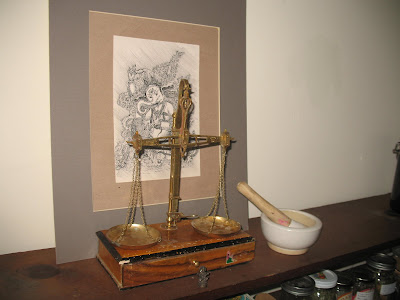

Above: Sections of my fast-growing home pharmacy
Hindsight is a useful, if frustrating perspective: even as one appreciates its clarity, one also wishes that clarity hadn't been so elusive at the time! Six months after Nepal, the personal meanings of my time there come into clearer focus.
Alright, full disclosure: the following is mostly lifted from a Chinese medicine grad school application essay I've been writing. And I promise: no more anti-globalization rants for a while.
While in Nepal on a Fulbright fellowship from September 2008 to July 2009, I had a chance to immerse myself in the world of the ancient Southasian medicine known as Ayurveda. Once the initial giddiness of exploring hole-in-the-wall herb shops along Kathmandu’s ancient, winding cobblestone streets and meeting Ayurvedic doctors, shamans, and yogis started to wear off, I grew aware of a gaping and contentious divide in the Ayurvedic world. One on side were the traditional vaidyas, doctors trained in the the oral tradition from one generation to the next. They had no formal degrees, just the accrued experience of their fathers and grandfathers before them and books of Sanskrit verse containing a wealth of information on medical theory and herbal formulations. On the other were the institutionally-trained Bachelor of Ayurvedic Medical Science doctors. Though their curriculum included the Charaka Samhita and other ancient texts of Ayurveda, their clinical practice was heavily influenced by Western medicine. I saw Ayurvedic students learning to use stethoscopes and prescribe antibiotics, and when they took a patient’s pulse it was simply to count bpm, rather than assess the traditional qualities of the pulse.
While this hybrid practice may be an exciting step towards integrative medicine, I could never shake the feeling that Ayurveda was selling its soul for more social prestige and a higher profile. As a result, I ended up spending as much time as I could with the dying breed of traditional vaidya, hearing their stories and absorbing what wisdom I could. Towards the end of my stay in Nepal I met Keshab Kavi Baidya, a generational practitioner of Rasa Shastra, Ayurvedic alchemy. Here, finally, was an embodiment of the living tradition who actually wanted to pass along his art. With none of his children interested in carrying on his lineage, I realized that he looked to me as his heir-apprentice. When I visited him he would quiz me on the uses of different herbs, and I once heard him telling another old man in Newari “this is an American student, he knows everything about herbs.” I was flattered and humbled beyond belief. On my last visit to Keshab-ji before leaving Nepal, the normally youthful-seeming man looked his seventy-plus years of age. His eyes betrayed a weary acceptance of the fact that his lineage would die with him. I was almost overcome by the sadness of the situation. Keshab-ji had put together a kit of medicines at my request: purified Shilajit mineral pitch, incinerated black mica, oyster shell ash--some of the fruits of decades of his labor. He parted with them knowing at least that I would make some use of them. I learned a few months later that Keshab-ji died shortly after I left Nepal.
This experience left me with the sense that it is for me to carry a part of this and other endangered medical traditions’ fire to a world in need of the light and warmth. In the words of the I Ching, I am to “nourish with ancient wisdom” through “subtle penetration,” as water slowly permeates rock and nourishes the roots of the tree of life. To that end, I am now applying to classical Chinese medicine programs, as that seems to me the best fit for me in the US context. I hope to start school again in Fall '10 or '11. You can be certain of hearing plenty more about Chinese medicine, including what the difference between "traditional" and "classical" chinese medicine is, as Illwind and I continue to evolve.
In the meantime, I want to offer what knowledge and experience I have gained in the way of healing and self-knowledge to anyone out there who feels inspired to connect. I am offering free wellness consultations, via phone and email, from an Ayurvedic and more broadly herbal perspective. My toolkit includes nutritional advice and cooking skills, Eastern and Western herbal formulas, and general lifestyle management gleaned mainly from Ayurveda. A consultation includes an assessment of your constitution and any areas of imbalance (excess or deficiency of elemental energies, Ayurveda's three doshas) as well as a treatment strategy based primarily on diet and herbs. I am also open to answering any questions readers may have about health, herbs, or Ayurveda either in private via email or, by your consent and my interest, using this blog as a forum. In our absurdly speedy world, I'm at your service almost instantaneous: jedwardian@gmail.com
I should add here the disclaimer that I do not claim medical expertise and my services are not intended as a substitute for medical care. I do not claim to diagnose or treat any medical condition. Services offered here are rather offered as a complement to competent medical care and as means towards greater self-knowledge and connection with the natural world.
Coming Soon: Delights of Devon Avenue

Maybe we can do a screening consultation via Skype this weekend?
ReplyDeleteIn the meantime, you can help your readers link East and West. Answer that burning Western office worker question with Eastern wisdom: how much coffee is too much?